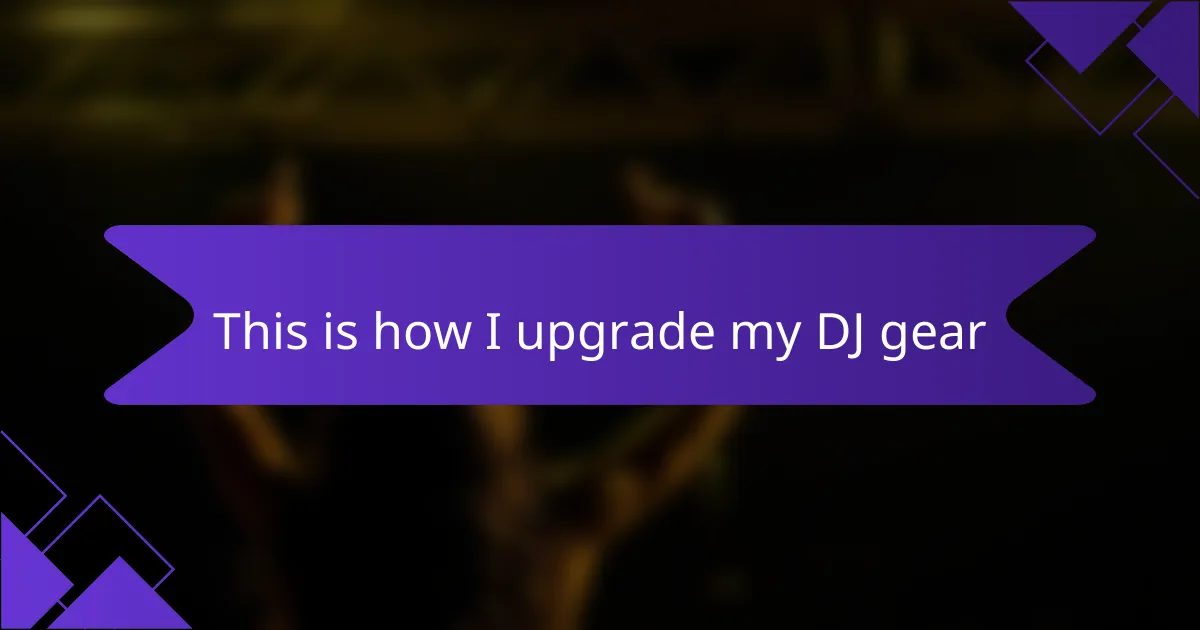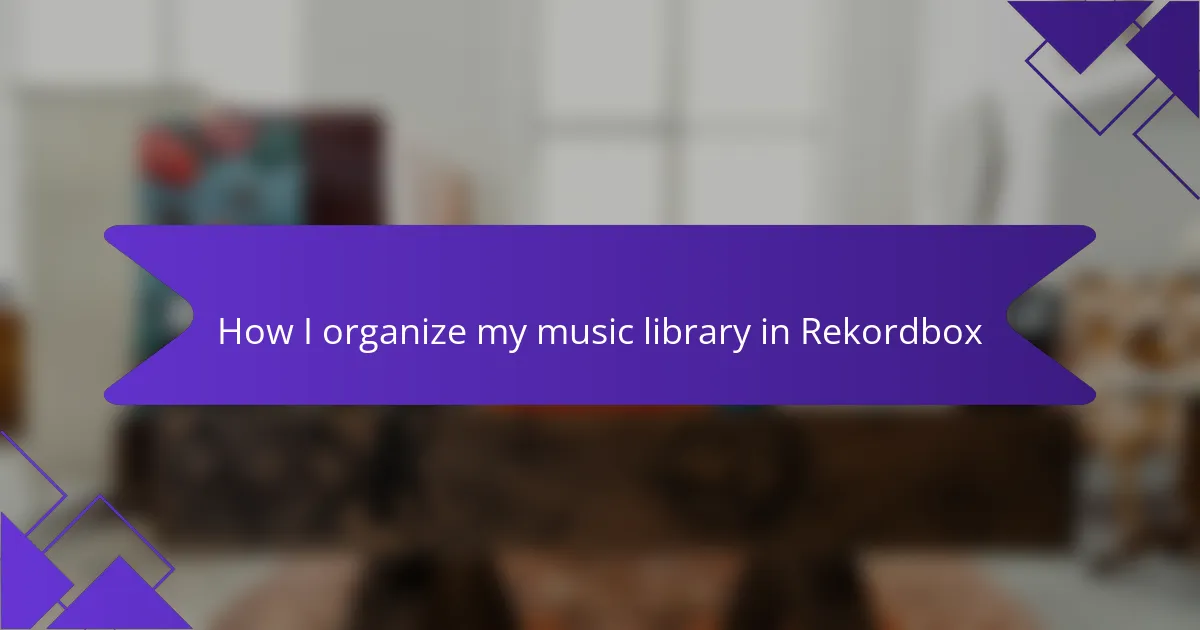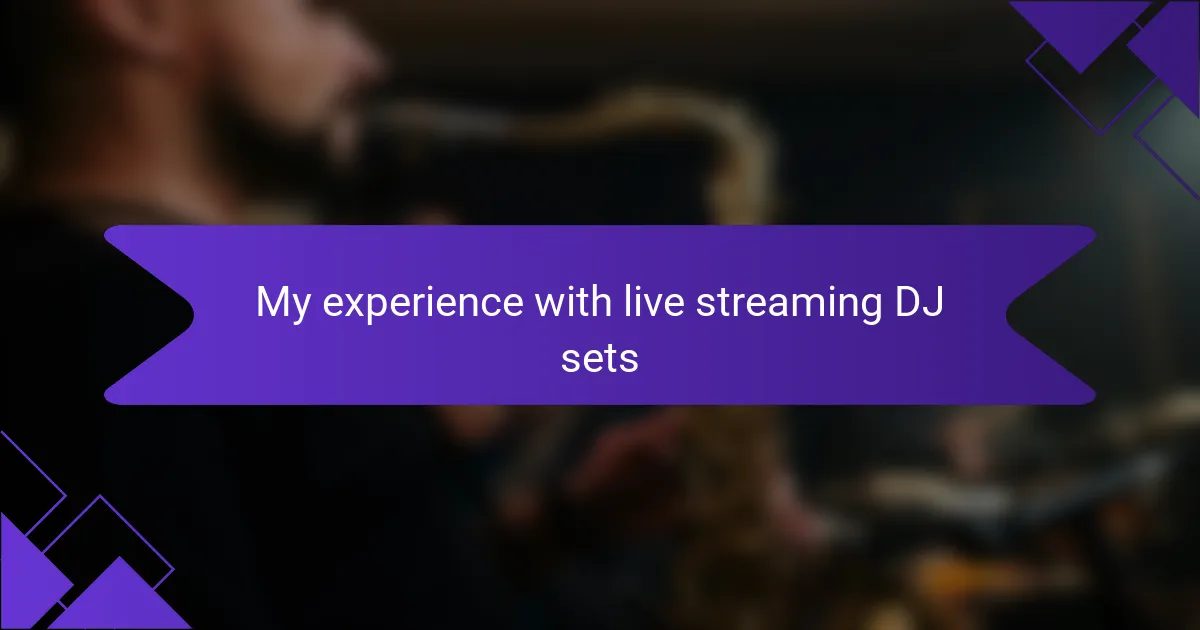Key takeaways
- Proactive DJ scheduling enhances performance and creativity while reducing stress and burnout.
- Utilizing effective tools like Google Calendar and DJ Event Planner streamlines organization and communication.
- Time blocking strategies, such as the Pomodoro Technique, help maintain focus and energy for various tasks.
- Balancing personal life with DJ gigs is crucial; setting boundaries and prioritizing commitments allows for meaningful personal moments.
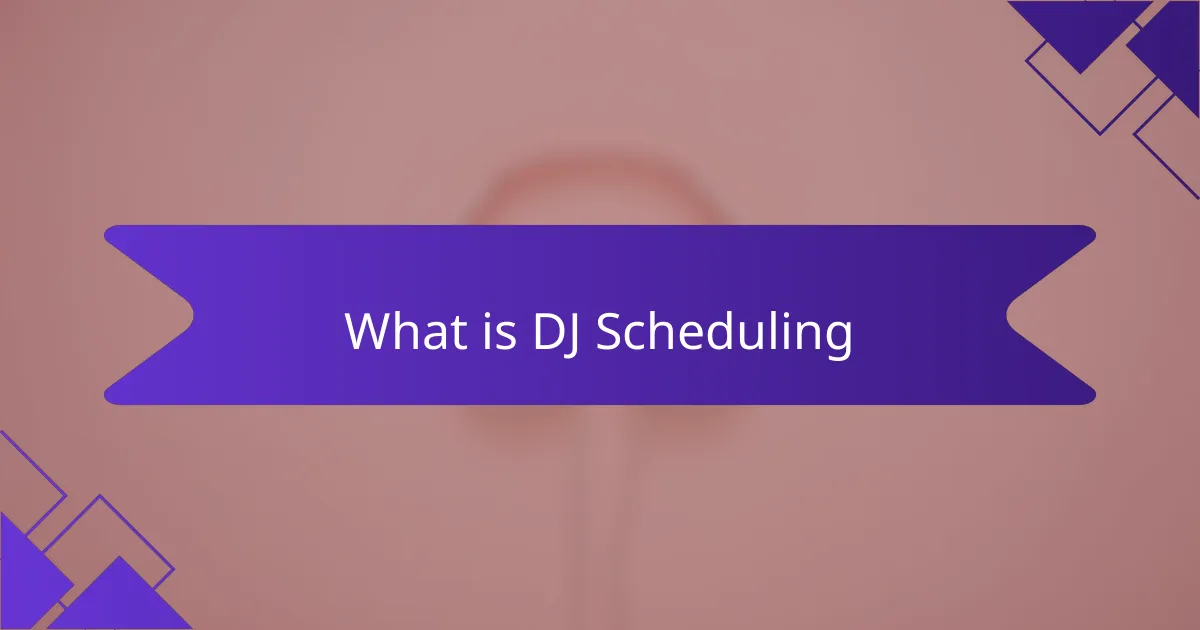
What is DJ Scheduling
DJ scheduling is the method by which DJs organize their performance dates, practice sessions, and promotional activities. I often find it fascinating how one missed booking or forgotten rehearsal can throw off an entire month. Have you ever felt the stress of juggling multiple events? It’s a balance that demands attention and organization.
Managing a DJ schedule goes beyond simply marking dates on a calendar; it’s about timing, commitment, and fostering relationships within the industry. For me, each gig is an opportunity to connect with my audience and fellow DJs. I remember a time when I tried to squeeze in too many events, resulting in burnout rather than excitement. Does that ever happen to you?
The heart of DJ scheduling lies in proactive planning. I’ve learned to allocate time for not just performances but also for marketing and networking. This holistic approach keeps my passion alive and my schedule manageable. How do you keep your creativity flowing amidst a busy agenda?
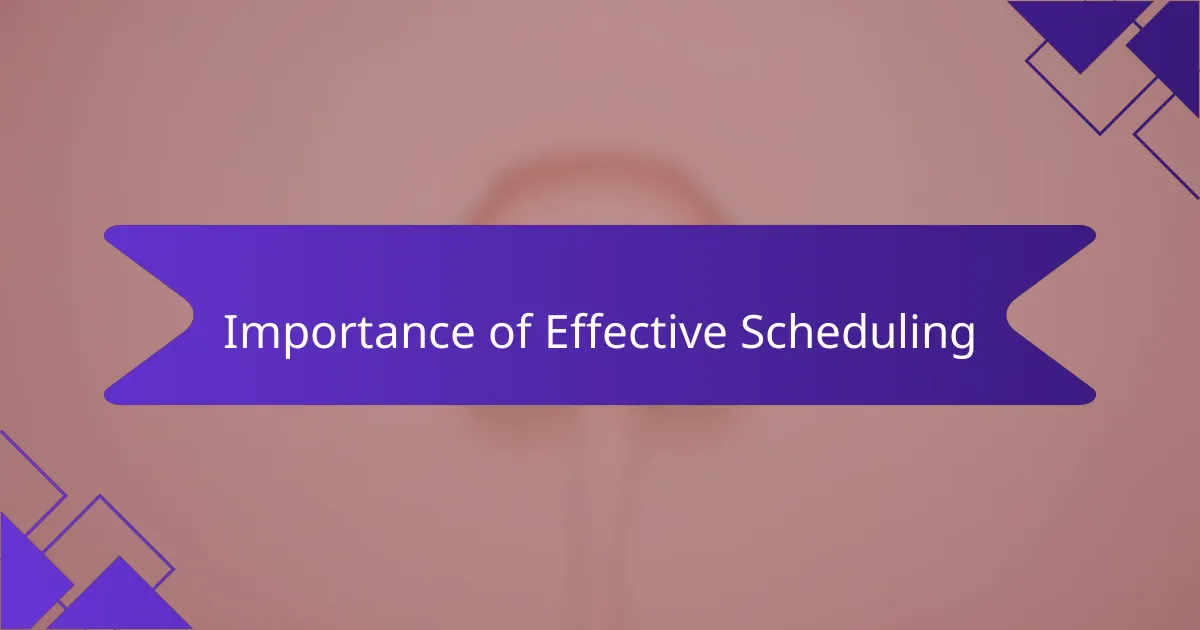
Importance of Effective Scheduling
Effective scheduling is crucial for a DJ like me, as it directly impacts my ability to perform at my best. I remember a time when I double-booked two gigs on the same night—it was a nightmare! I had to choose between two eager crowds, and the stress was overwhelming. Learning from that experience reinforced the importance of precise planning.
When I manage my schedule well, I not only maximize my performance opportunities but also ensure I have time for rest and preparation. This balance is key; burnout can sneaky creep up on you. It’s amazing how a well-structured calendar can alleviate anxiety and enhance creativity. Here are some key reasons effective scheduling matters:
- Optimized Performance: Prepares me for each event mentally and physically.
- Reduced Stress: Minimizes the risk of overlaps and last-minute chaos.
- Time for Promotion: Allocates time for marketing and connecting with audiences.
- Improved Reputation: Reliability builds trust and can lead to repeat bookings.
- Space for Creativity: Allows moments of inspiration and personal projects outside of gigs.
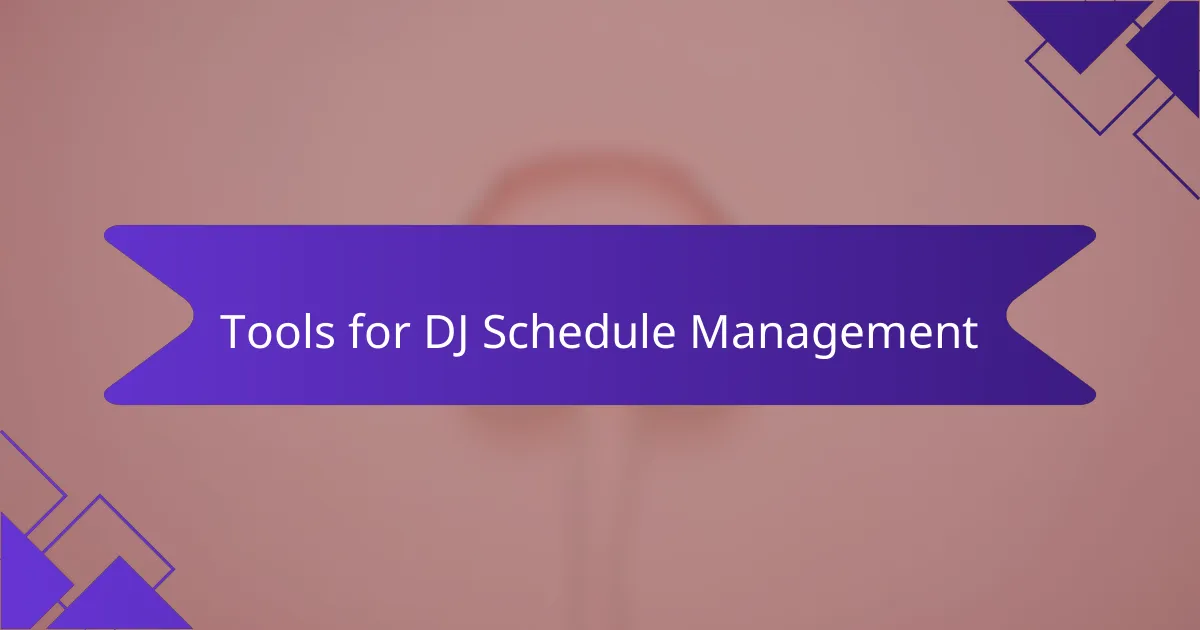
Tools for DJ Schedule Management
When it comes to managing my DJ schedule, having the right tools makes all the difference. I often rely on scheduling apps and calendar integrations to keep my gigs organized. For example, I use Google Calendar, not only because it syncs across all my devices, but also because it allows me to set reminders, which helps me avoid those last-minute panics.
Additionally, I’ve found that some dedicated DJ management tools like DJ Event Planner help streamline my bookings, contracts, and even song selections. These platforms aren’t just functional; they also give me peace of mind knowing everything is in one place. Sharing my calendar with collaborators means we’re all on the same page, reducing miscommunication and stress.
Here’s a quick comparison of some of the tools I’ve found invaluable for managing my DJ schedule effectively:
| Tool | Key Features |
|---|---|
| Google Calendar | Cross-device sync, reminders, shared calendars |
| DJ Event Planner | Bookings, contracts, song selection management |
| Asana | Task management, project tracking, collaboration features |
| Gigwell | Engagement tracking, invoicing, client management |
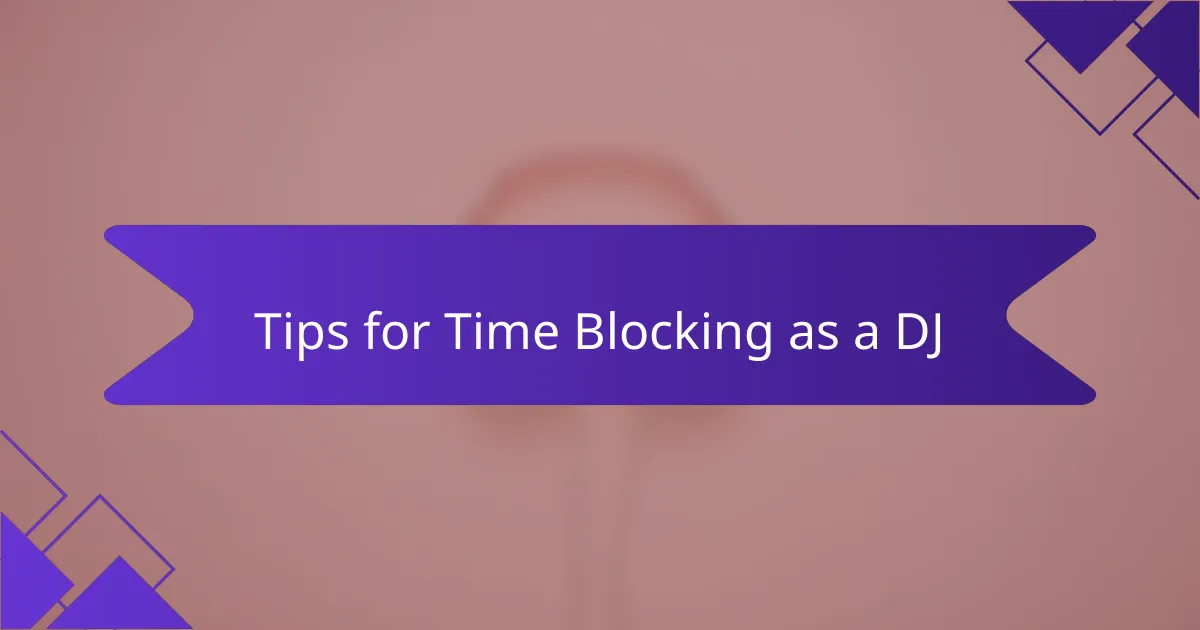
Tips for Time Blocking as a DJ
When it comes to time blocking as a DJ, I’ve found that breaking my day into focused segments is a game-changer. I allocate specific hours not just for gigs, but for practice, promotion, and even downtime. Have you ever crammed everything into one day and felt exhausted? I certainly have. By assigning dedicated time slots, I can approach each task with fresh energy and a clear mindset.
One effective technique I use is the ‘Pomodoro Technique.’ This method involves working in 25-minute bursts followed by short breaks. I’ve noticed that having these mini breaks keeps my creativity flowing and helps me recharge. It’s surprising how a little pause can lead to fresh ideas during a mixing session. Have you tried anything similar?
I also prioritize my tasks by urgency and importance, which helps immensely in avoiding last-minute chaos. For instance, if I know I have a big gig coming up, I’ll block out extra practice time the week before. This planning prevents stress and makes each performance more enjoyable. What strategies do you use to manage your DJ time?
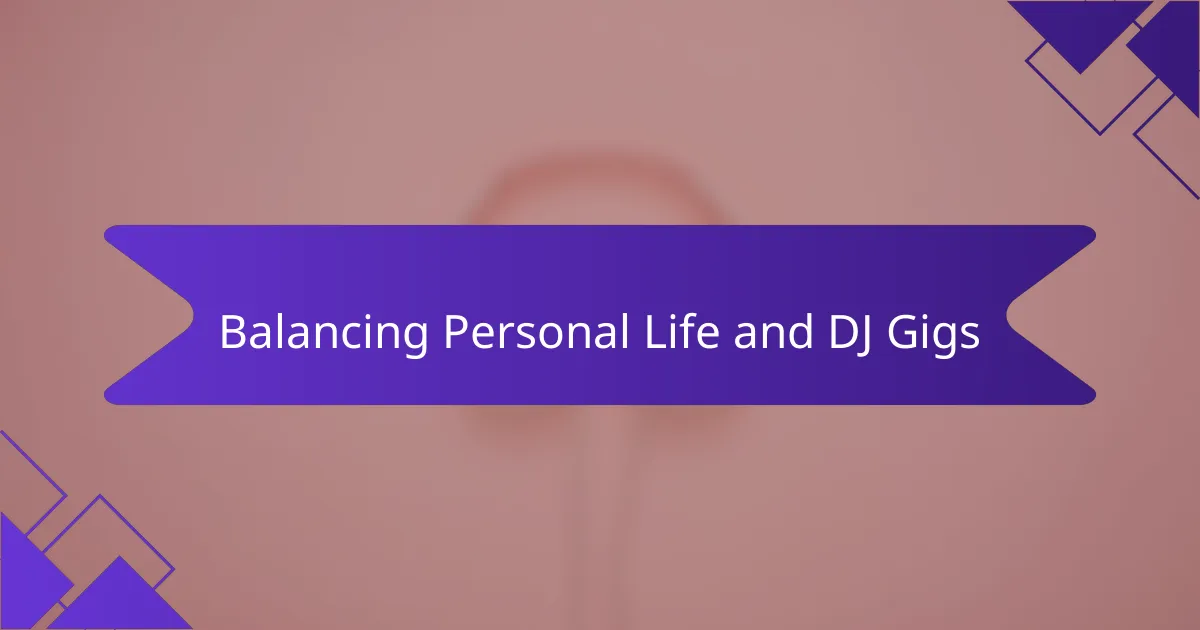
Balancing Personal Life and DJ Gigs
Balancing personal life and DJ gigs can be a tricky endeavor. From my own experience, I’ve often found myself torn between a late-night show and an important family gathering. It’s crucial to set boundaries; I’ve learned the hard way that saying “no” sometimes opens up space for more meaningful moments in my personal life.
To maintain this balance, here are some effective strategies I’ve used:
- Prioritize personal commitments: Ensure to mark family events and important dates on the calendar first.
- Create a flexible DJ schedule: I try to schedule gigs for times that don’t conflict with personal obligations.
- Use a planner: Keeping a dedicated planner helps me visualize my time and avoid overcommitting.
- Communicate with loved ones: I share my gig schedule with family and friends, keeping them in the loop.
- Schedule downtime: Make it a point to dedicate time just for yourself to recharge amidst the hustle.
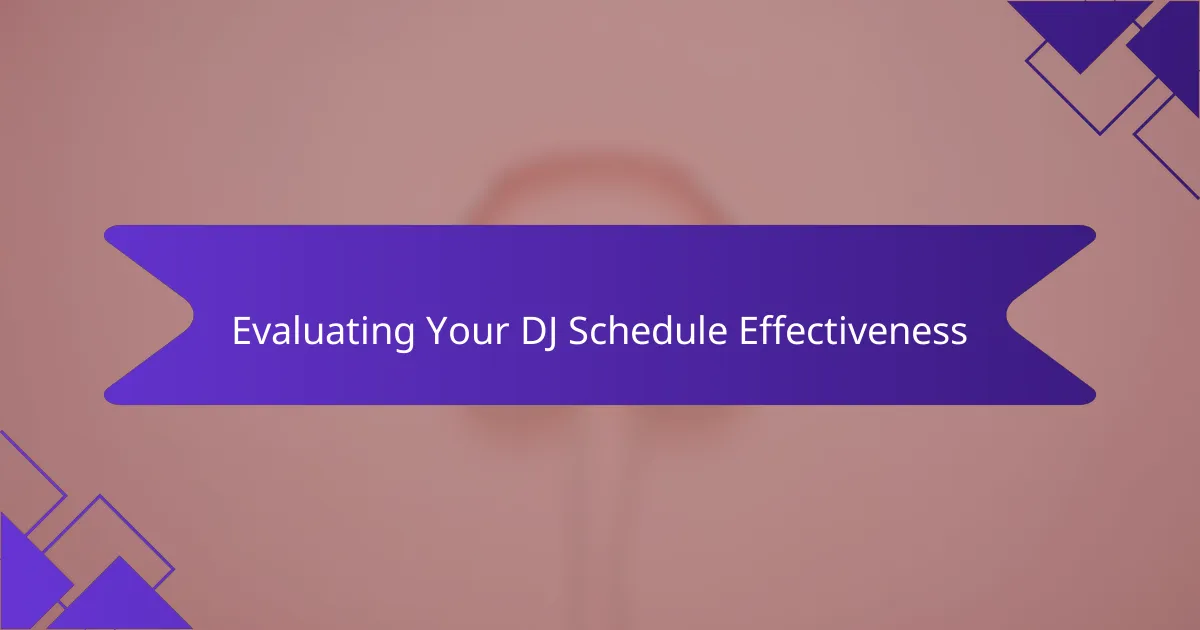
Evaluating Your DJ Schedule Effectiveness
When it comes to evaluating my DJ schedule effectiveness, I first look at the overall flow of my gigs. I remember the time I had back-to-back events on consecutive weekends, and I ended up feeling drained. That experience taught me the importance of balanced scheduling—not just for my energy but also for delivering the best performance possible. Balancing high-energy club nights with more low-key events allows me to stay fresh and engaged with my music.
One crucial aspect of assessing my schedule is tracking various factors that contribute to my success as a DJ. Here are some key points I consider:
- Attendance Rates: How many people showed up to each event?
- Audience Engagement: Were attendees dancing and enjoying themselves?
- Gig Feedback: Did I receive positive feedback from clients and party-goers?
- Personal Energy Levels: How did I feel after each event?
- Travel Time: Was the commute manageable or exhausting?
- Income Comparison: Am I meeting my financial goals with this schedule?
Each of these elements helps me refine my approach and ensures I’m producing not just events, but memorable experiences. Evaluating my schedule this way has transformed my performances and my connection with the audience.

